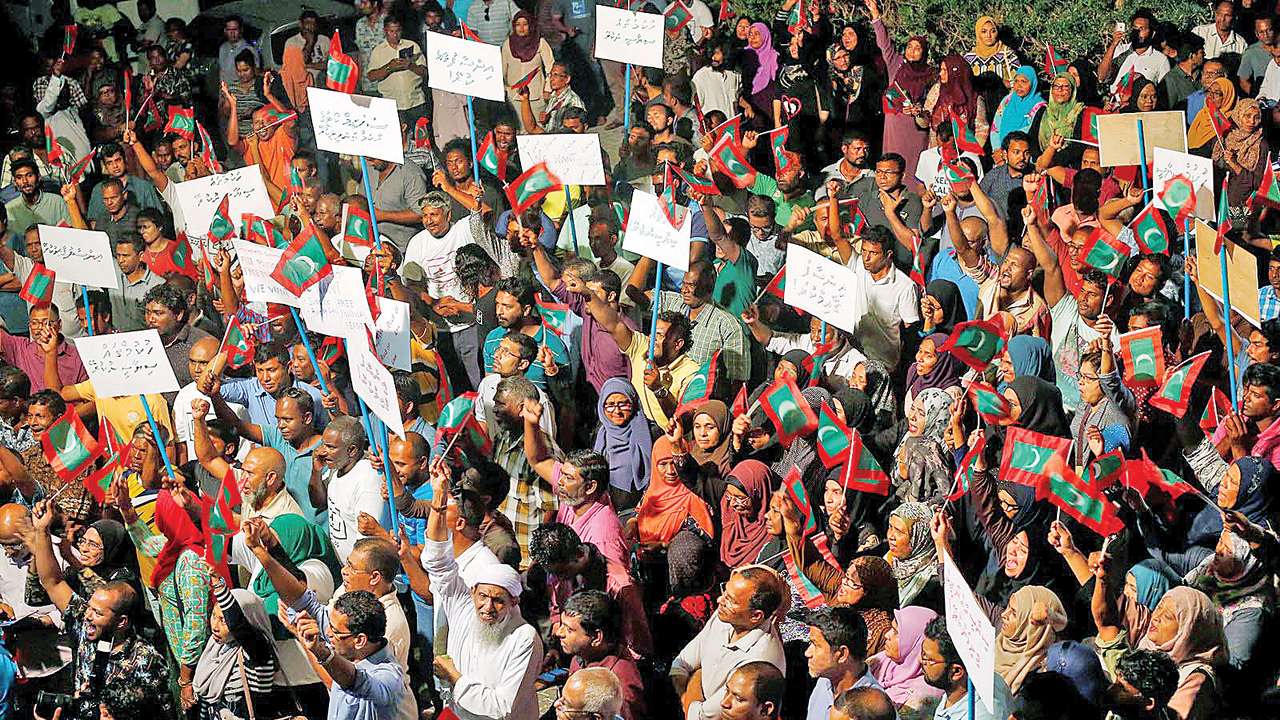
These are testing times for India in the region. From the Maldives in the south to Nepal and China in the north, apart from Pakistan which is a thorn in India’s side, the country is facing serious foreign policy challenges. How the government of India (GoI) responds, especially to the crisis in the Maldives and the power vacuum in Nepal, would determine its regional stature and image.
The neighbourhood crisis is clearly a Catch-22 situation. A single wrong move in a bid to reinforce its stature as the “leading power” that calls the shots in the region could leave India’s image, influence and reputation badly damaged.
The unfolding situation in the neighbourhood comes within days of Vijay Gokhale taking over as Foreign Secretary from the redoubtable S Jaishankar, who was the most powerful incumbent to hold the office in recent decades, and that, too, for three years. Gokhale, a seasoned China hand, who was ambassador to China, played a key role in resolving the Doklam military stand-off last year. However, the developments we are now witnessing could be very difficult to handle for even the most accomplished of diplomats given their political and security ramifications.
The most difficult test is dealing with the Maldives where President Abdulla Yameen declared a 15-day state of emergency on February 5. While the Ministry of External Affairs (MEA) and/or the Ministry of Defence (MoD) may be the one assigned to fish in the troubled waters, it is no secret that the decision on what is to be done would be a political one taken at the highest level by the Prime Minister in consultation with his aides.
The MEA’s statements, thus far, on the happenings in the Maldives do not redound to India’s credit simply because it has been ignored by the Maldivian President. The tone and tenor of the MEA’s statements so far and the atmospheric build-up suggest that New Delhi may well be contemplating a regime change in the Maldives.
The trigger that escalated the current political crisis was the country’s Supreme Court ordering, on February 2, the immediate release of nine political prisoners including former President Mohamed Nasheed and reinstating 12 MPs who had been unseated. This was a shot in the arm to the opposition, which would then have gained a majority and the numbers to initiate impeachment of the President.
The President’s hostile rejection of the ruling made the Supreme Court rescind its order the day after the imposition of emergency. Chief Justice Abdulla Saeed was accused of being bribed. After emergency was declared, he and former President Maumoon Abdul Gayoom were arrested on charges of plotting to overthrow the government.
On February 2, GoI reacted to the apex court’s order saying that “it is imperative for all organs of the Government of Maldives to respect and abide by the order of the apex court”. This was, perhaps, in response to the opposition in the Maldives requesting India, “to do everything in their power to impress upon the Government of Maldives, security services and institutions to respect the Supreme Court ruling and to uphold the Constitution”. On February 6, expressing concern over the arrest of the chief justice and political figures, an MEA press release said that India is disturbed by the declaration of emergency and suspension of people’s constitutional rights.
Predictably, President Yameen did not take note of India’s explicit concerns. Gayoom and Nasheed, once sworn enemies, have now joined hands to lead the opposition which enjoys the support of not only India but also the “international community”.
Indian armed forces are on high alert and GoI is in touch with the US and the UK among others. This suggests that with US support, New Delhi might not be averse to engineering a regime change in the Maldives like it had carried out, in concert with the “international community”, in Sri Lanka in 2014.
However, Indian intervention could send shock waves among South Asian neighbours especially Nepal. Some two months after the elections in Nepal, the Left Alliance of the communist parties is yet to be allowed to form the government. Any Indian action in the Maldives may revive memories of the economic blockade Nepal was subject to in 2015.
Although GoI’s stated concern in the Maldives is democracy, the real reason New Delhi may want a regime change is because the country has slipped out of “India’s orbit” to embrace the Chinese, much like Sri Lanka and Nepal did. Recently, Maldives signed a free trade agreement with China and joined its Belt and Road Initiative.
The very reason for which New Delhi wants to turn the political tables in the Maldives is the reason it should desist from any “intervention” with a view to loosening the Chinese hold on President Yameen. In Sri Lanka, the Chinese influence and economic clout has not waned after the regime change. Similarly, in Nepal, after the economic blockade, the bid to stall the new constitution and the ouster of Prime Minister K P Oli of the Communist Party (Unified Marxist-Leninist), the Chinese have only made deeper inroads and increased their influence.
The exit of President Mahinda Rajapakse in 2014 not reducing China’s stakes in Sri Lanka and the thumping electoral victory of the Left Alliance led by Oli’s party in Nepal are cautionary tales indicating that Indian intervention may not necessarily achieve the desired objective of strengthening democratic forces to send President Yameen packing and restore the constitutional order.
The author is an independent political and foreign affairs commentator